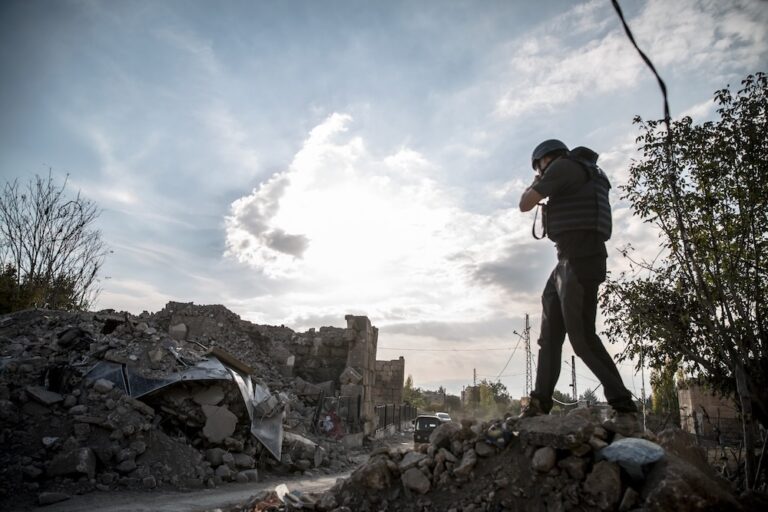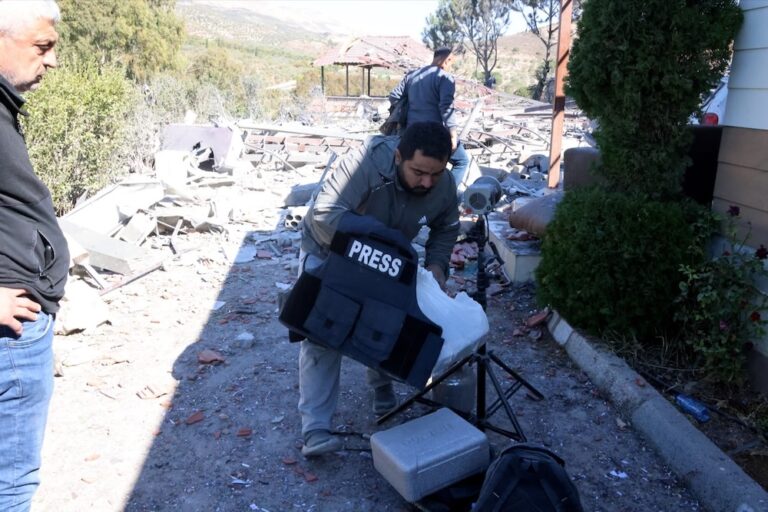As excessive force threatens protesters in Lebanon, the Gulf Centre for Human Rights calls on authorities to fulfil legal obligations protecting the right to peaceful assembly.
This statement was originally published on gc4hr.org on 27 October 2019.
By human rights defender and academic Dr. Kholoud Al-Khatib
International law protects and promotes respect for human rights, which are interdependent and indivisible. It is not possible to protect any single human right without ensuring respect for the rights to freedom of opinion and expression and the right to peaceful assembly. This needs to be held true in Lebanon, as it enters the second week of protests against government corruption and the worsening economic crisis. The protests, nicknamed the Tax Intifada and Whatsapp Revolution, began after the government introduced taxes on gas, tobacco and WhatsApp calls.
According to research commissioned by the Gulf Centre for Human Rights (GCHR), Lebanon is legally bound to respect the rights of the protesters, who are tired of a government which offers poor services.
It is impossible to protect the human right to life and security, the right to work, the right to equality before the law, the right not to be discriminated against, the prohibition of torture, cruel, inhuman or degrading treatment and a host of other rights, without protecting the right of individuals and groups to express their rejection of an existing Government that does not respect their fundamental rights. This cannot be done without activating the ability to fight corruption and establishing the right to information and accountability.
The set of rights associated with the realisation of human dignity is directly related to freedom of opinion and expression, especially the right to peaceful assembly, which are essential tools to correct the performance of power and promote citizenship and the political participation of citizens. These rights are protected by the Universal Declaration of Human Rights and the International Covenant on Civil and Political Rights, to which Lebanon is a party, and which are protected by the Lebanese Constitution and law. This obligation requires the government to ensure that security forces treat protesters in line with Lebanon’s international human rights obligations by taking all necessary measures to protect the exercise of the right to peaceful assembly.
Lebanon’s legal obligation to protect the right to peaceful assembly
The international and national legal framework in force in Lebanon guarantees the right to life, the right to liberty, the safety of persons, as well as the right of citizens to freedom of expression and peaceful assembly.
Peaceful assembly is a fundamental human right which all individuals and groups enjoy and is inseparable from other public freedoms, and fundamental to the protection of a pluralistic society. The right to freedom of peaceful assembly is an essential element of democracy. Restrictions on the exercise of this right may be imposed only on those which are prescribed by law and constitute necessary measures for the maintenance of security, public safety or order, the protection of public health or morals, or the protection of the rights of the public.
Article 20 of the Universal Declaration of Human Rights states: “Everyone has the right to freedom of peaceful assembly and association.” Article 21 of the Covenant on Civil and Political Rights also guarantees the right to peaceful assembly. Article 13 of the Lebanese Constitution guarantees freedom of expression, in writing and orally, as well as freedom of assembly and association.
Work of law enforcement officials during demonstrations
Security is also based on a number of international instruments, including the United Nations Principles on the Use of Force and Firearms by Law Enforcement Officials and the United Nations Code of Conduct for Law Enforcement Officials.
This legal framework requires the government not only to allow the facilitation of gatherings, but also to enable their organisation, taking all protection measures for demonstrators, taking concrete steps to prevent human rights violations during demonstrations, ensuring accountability, and facilitating an enabling environment for all individuals and groups to exercise their right to peaceful assembly and freedom of expression.
International instruments and mechanisms have obligations for law enforcement officials to respect rights, that is, to refrain from interfering without legitimate reason (e.g. restriction of freedom, peaceful dissolution) and the duty to protect rights, i.e. to take measures to prevent violations of human rights (refrain from the use of excessive force). In practice, this means that security forces must ensure a balance between maintaining security and the right to assemble during demonstrations, and take the necessary measures to preserve the “right to peaceful assembly” positively during demonstrations and observe the principles of “necessity, proportionality and legality.”
Since the protests in Lebanon began on 17 October 2019, the country has come to a standstill with roads blocked and all businesses and banks closed. Protests have been largely peaceful across the country, but with some violence against protesters leading to several deaths and injuries. In the first weekend of protests, over a hundred protesters were arrested, but they were released the next day. According to news reports, some of them were injured.
While the government has made some concessions to the protesters, such as cancelling the planned tax on WhatsApp calls, and implementing economic reforms which include government efficiencies and a halt to raises, the protesters have remained in the streets and called for the entire government to resign, not just a few Ministers.
The GCHR calls on the authorities in Lebanon to respect their international obligations, in particular to:
- Fulfill its international obligations to protect freedoms of assembly and expression, by allowing demonstrators to peacefully assemble without fear of repression or arrest, and to ensure that the media operate freely and that access to the Internet is not prohibited;
- Ensure that excessive force is not used, whether by security forces or other individuals, against peaceful demonstrators;
- Refrain from arresting peaceful demonstrators in reprisal for their actions; and
- Ensure that all human rights defenders in Lebanon who carry out their legitimate work in the defense of human rights are able to operate without restrictions, including judicial harassment.



